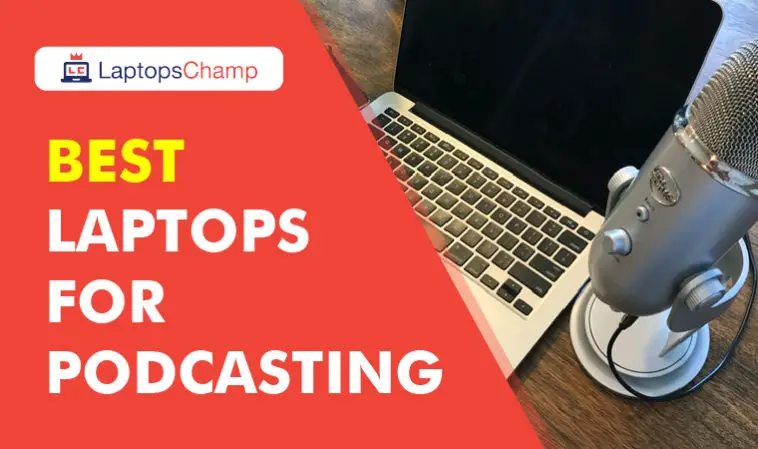Complete List: Top 5 best laptops for podcasting
| Image | Product | Buy |
|---|---|---|
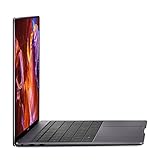 Top
Top
Top
Top
Top
Top | Huawei MateBook X Pro Signature Edition Thin & Light Laptop, 13.9" 3K Touch, 8th Gen i7-8550U, 16 GB RAM, 512 GB SSD, GeForce MX150, 3:2 Aspect Ratio, Office 365 Personal, Space Gray - Mach-W29C | See Price |
 Top
Top
Top
Top
Top
Top | Dell XPS 13 9310 Thin and Light Touchscreen Laptop, 13.4 inch FHD+, Intel Core i7-1195G7, 16GB LPDDR4x RAM, 512GB SSD, Intel Iris Xe Graphics, 2Yr OnSite, 6 months Dell Migrate, Windows 11 Pro. Silver | See Price |
 Top
Top
Top
Top
Top
Top | ASUS VivoBook S15 S533 Thin and Light Laptop, 15.6” FHD Display, Intel Core i5-1135G7 Processor, 8GB DDR4 RAM, 512GB PCIe SSD, Wi-Fi 6, Windows 10 Home, Indie Black, S533EA-DH51 | See Price |
 Top
Top
Top
Top
Top
Top | Huawei MateBook Signature Edition 2 in 1 PC Tablet, 4+128GB / Intel Core m5 (Space Gray) | See Price |
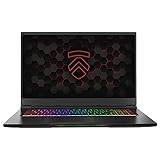 Top
Top
Top
Top
Top
Top | Eluktronics MAX 17 (2021) 17.3" RTX 3060 Gaming Laptop, AMD Ryzen 7 4800H Processor, NVIDIA GeForce RTX 3060 Graphics Card, 17.3 inch QHD 165Hz Display, 512GB NVMe SSD, 16GB DDR4 RAM, Windows 10 Home | See Price |
This article may include references and links to products and services from one or more of our advertisers. We may be paid compensation when you click on links to those products and/or services. As an Amazon Associate, we earn from qualifying purchases.
This article contains affiliate links, which means that if you click on one of the product links and make a purchase, we may receive a commission. Please note that this article is for informational purposes only and should not be construed as financial or investment advice. We do not endorse any specific product or service mentioned in this article.
Landing on this page is the right decision if you are searching best laptops for podcasting. Podcasting is the best inexpensive way to spread your voice across the world and get it heard by millions of people. The interactive and engaging format of podcasting is an effective way of reaching a wider audience. It helps you deliver useful and informational content in a captivating yet fun way. Moreover, it reinforces your brand reputation and establishes you as an industry authority. Podcasting is often less resource-intensive compared to other forms of content creation, such as video production.
Just talking into a microphone doesn’t call podcasting. Proper podcasting requires some perfect podcasting gear that can fulfill your requirements to get your voice heard by lots of people. The most obvious components of a podcasting kit include a microphone, a pop filter, a mic stand, etc. Many podcasters also use an audio interface or a mixer to simultaneously work on multiple tracks. However, one piece that is often overlooked is the laptop.
There are several podcasting gears required to create a highly engaging and effective podcast. If you have purchased headphones and microphones but are feeling confused to select the best laptops for podcasting then you are landed in the right place now.
During my research, I have collected reviews by expert podcasters on the best model of laptops for podcasting. After the research, I have compiled a list of some latest podcasting laptops available on the market.
Here I will recommend you some podcasting laptops and mention some popular ones as well. This post may contain affiliate links that won’t change your price but will share some commission. I will also point out the cons.
1. Huawei MateBook X Pro Podcasting Laptop
Huawei MateBook X Pro is really a mainstream laptop that should attract that buying bargain. The laptop provides a good mixture of decent efficiency and design which should satisfy most podcasters. Huawei MateBook X Pro comes with 1 year Office 365 Personal and 1-year manufacturer warranty.
Processor: MateBook X Pro equipped with an 8th Gen 1.8 GHz Intel Core i7 8550U processor. This processor is the main new batch from Intel. Since that’s the case, you won’t obtain the same degree of performance or the battery-saving features that the brand new 8th generation Core i7 processors provide.
The processor should suffice for podcasters because they perform music editing tasks on different software, as well as take part in multitasking. Additional multitasking help comes in the shape of 16GB of LPDDR3 RAM.
Performance: Huawei offers enough storage on the MateBook X Pro with a 512GB solid-state drive. Graphics are supported by NVIDIA GeForce MX150 2GB graphics card. The biggest thing that you should have considered in the best laptops for podcasting features is their battery. In the event that you intend on podcasting while unplugged, you may expect about eight hours of usage.
On the other hand, this can be a multi-purpose laptop and is never exactly meant as a companion for the podcaster. For the operating system, you receive the conventional fare of Microsoft Windows 10 Home Signature Edition.
Additional Features: Additional options that come with this podcasting laptop are very standard. A media card reader is onboard if you want to transfer data from other devices. If you wish to connect with the web, the built-in 802.11.ac Wi-Fi will be handy. Last, but not least maybe the built-in webcam and microphone for video emailing friends.
Construct and Design: Huawei didn’t include a lot of frills with regard to the MateBook X Pro design. The laptop includes a rather generic look using its proprietary Huawei Imprint finish in Space Gray, editing sound does not require powerful laptops like video editing.
Something that would be said for this podcasting laptop’s look is that it’ll merge well with any environment, either casual or professional. The laptop includes a sturdy overall feel and measures 304mm wide by 217mm tall by 14.6mm thick.
Display and Audio: The 13.9-inch 3KIPS display includes a 3000 x 2000 resolution that produces decent graphics. The display’s size makes the laptop a viable alternative for watching videos, even though built-in speakers can exactly shatter your windows, so you don’t need extra headphones.
Keyboard: The full-size spill-proof keyboard would work for typing using its wide, flat keys. It has a great keyboard with a bright screen and all the other basics that you are looking for.
Ports & Connectivity: You receive a Mate Dock with HDMI, Type-C charger, VGA, USB-C & USB-A ports Perfect for work and travel. A microphone and headphone jacks are also included in Huawei MateBook X Pro.
NO 1

Huawei MateBook X Pro Podcasting Laptop
Specifications:
- MateBook X Pro is equipped with an 8th Gen 1.8 GHz Intel Core i7 8550U processor
- and offers enough storage on MateBook X Pro with a 512GB solid-state drive
- built-in 802.11.ac Wi-Fi will be handy
- The full-size spill-proof keyboard would work for typing using its wide, flat keys
- HDMI, Type-C charger, VGA, USB-C & USB-A ports Perfect for work and travel
- Best speakers quality
- Colors brightness viewing angle is wonderful
- It has up to 10 hours of battery timing
- Weak warranty support
- Touchpad too big
2. Dell XPS 13 Best for Podcasting
The Dell XPS 13 is really a simple and inexpensive 13.3-inch podcasting laptop computer. Full of a battery-friendly 8th Generation Intel Core i7 processor chip and images, Dell guarantees this laptop can make the quality.
Construct and Style: At first, the newest Dell XPS 13 lightweight laptop series appears practically just like all of those other budget-priced Dell laptops in the past year. The XPS 13 is cut from a polished single block of aluminum of matte silver color. This is stronger than a laptop that is pieced together.
Screen: The only real part of this kind of laptop that feels especially durable would be the screen depends on this product which is fairly tight and contain the screen in place when you move the notebook from one location to another. I’m certain this notebook will endure just as well as a desktop computer replacement.
Storage and RAM: The Dell XPS 13 comes with 1TB of PCIe Solid State Drive storage that boots and resumes in seconds. 16GB of 16 GB DDR3 RAM enhances your multi-tasking experience while using podcasting software even on intense applications.
High Definitions Display: The Dell XPS 13 includes a 13.3-Inch 4K Ultra HD Infinity Edge touch display screen with 16:9 aspect ratios. The entire quality of the display screen is excellent. Lest we forget, the audio quality of this laptop is just so beautiful.
The backlight is also vibrant, the comparison is fairly sharp and the shades are great although the colors really are a little as well soaked at the default configurations. The Dell XPS 13 comes with the highest resolution of 3840 x 2160 pixels with a soft touch screen.
Ports and Functions: The modern XPS 13 functions as a sufficient collection of ports. You receive 2 Thunderbolt 3 with PowerShare that allows fast charging to your laptop. It has 1 USB 3.1 type-C Port, so you can connect multiple devices. USB 3.1 port also allows you data transfers up to 40Gbps which is 8 times faster than USB 3.0.
Battery Backup: The performance of any laptop highly depends on its battery timing. This amazing laptop gives you decent battery life backup for up to 4 hours while doing recording and editing podcasting tasks continuously.
You can expect battery time of around 8 to 10 hours while using this laptop for daily computing such as web browsing and live streaming etc.
The overall performance of this laptop is really amazing; several expert podcasters recommended this as one of the best laptops for podcasting.
NO 2

Dell XPS 13 Best for Podcasting
Specifications:
- Display: 13.3 inches
- Processor: i5 8th gen
- RAM: 16 GB
- HDD/SSD: 1 TB
- OS: Windows
- Battery: 7 hours
- Impressive battery life
- Great display quality
- Storage is more than enough
- High-speed processor
- The webcam location is not good
3. ASUS VivoBook S15
The ASUS VivoBook S15 is really a high-end one of the best laptops for podcasting whose external frame is really as luxurious as the fundamental elements. An all-aluminum framework, a backlit keypad, and some of the quickest elements obtainable are functions you’d find inside an Apple MacBook Pro or Dell XPS Series.
Therefore yes, the VivoBook S15 is usually voiced in the exact same breath as these types of quality laptop computers in life. Nevertheless, residual difficulties during multitasking and sometimes the freezing problem, although not offer an Optical drive.
Design and style: The ASUS VivoBook S15 is protected in lightweight at 3.5 lbs of aluminum metal. It comes in silver-blue with a yellow trim color combination. The textured finishes, innovative three-sided NanoEdge display, and ErgoLift design enhance your typing experience. Gaming laptops are equipped with powerful hardware to handle gaming and other heavy tasks, so a podcaster’s computing needs are easily handled by gaming laptops
And rather than a blown look, the cover and palm rest area are etched having a pretty imprint. VivoBook S15 can easily slip into the backpack which gives you a stylish look.
Display Screen: The S15 works on the 15. 6-inch widescreen, which is bigger than the 13-inch screens present in the Acer Chromebook 14 and ASUS C302CA. Nevertheless, the edge-to-edge glass plus some of the brightest LEDs get this display screen an ideal medium for HD movies and pictures.
Keyboard: The flat-top keys are properly spaced and elevated greater than those from the Apple MacBook Pro 13-inch. A backlit keyboard feature on this ASUS VivoBook is perfect for podcasting in dim environments. It is a remarkably useful tool for those podcasters who spend considerable time in low-lit locations.
Touchpad: ASUS VivoBook S15 enhanced the gestured touchpad fairly with a driver update, but it’s miles from fixed. I discovered that disabling these actions in the computer mouse configurations or clicking and tapping with one finger was an excellent workaround.
Ports and Connectivity: The VivoBook S15 offers both HDMI and Display Port technology while most notebooks ship with a single and another. Additionally, it sacrificed the VGA port along the way. The 2 USB 3.0 and USB 2.0 slots are disseminated on both sides.
If VivoBook S15 did not deliver the greatest elements it would not be considered one of the best laptops for podcasting.
NO 3
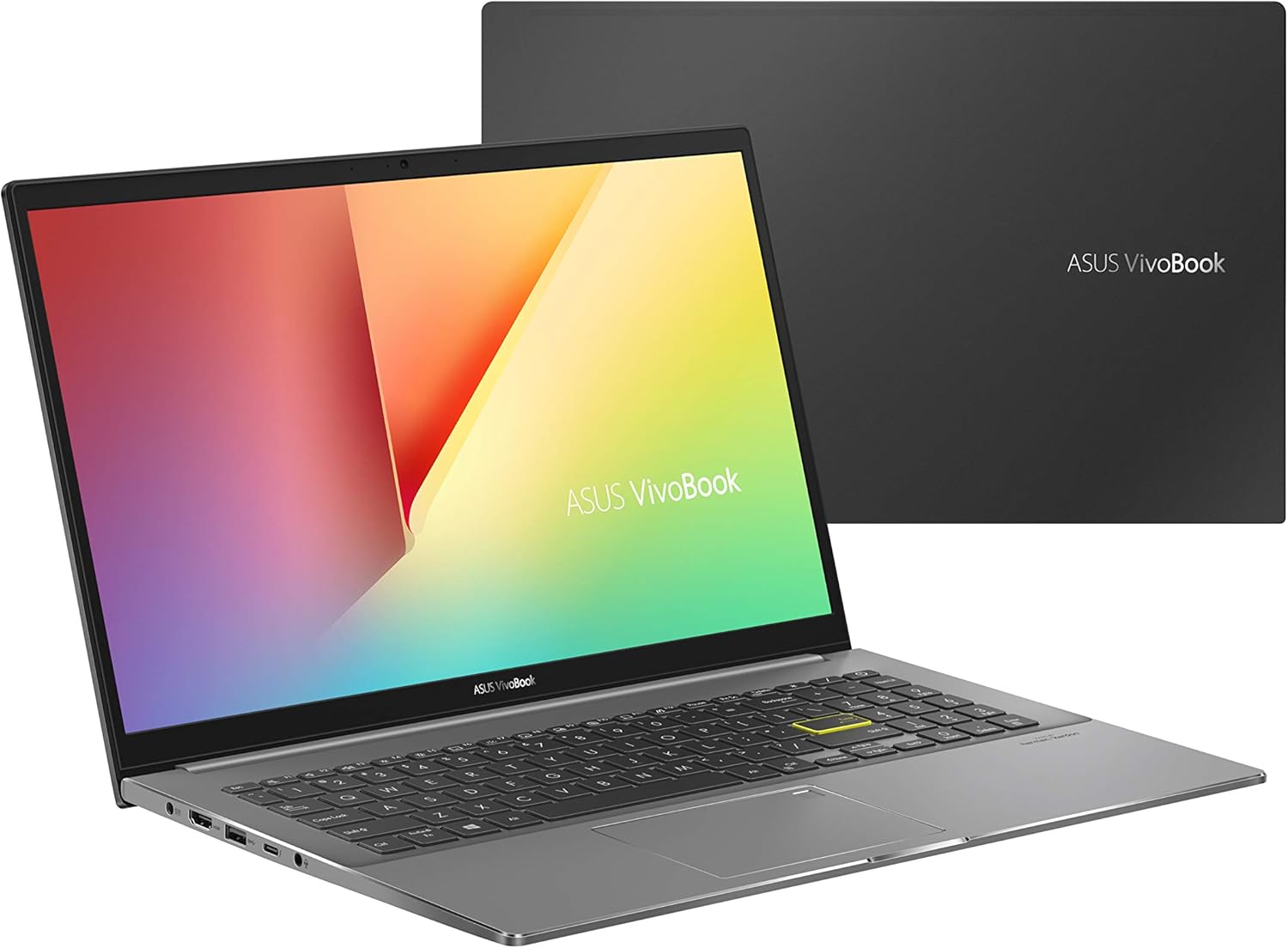
VivoBook S15One 2 SF
Specifications:
- 6-inch Full HD 1080p IPS panel, Anti-glare coating
- Intel Core i3-8130U/Core i5-8250/Core i7-8550
- Intel HD Graphics 620 + 2GB NVidia GeForce MX 150
- 4/6/8/12/16 GB DDR4 RAM
- 128GB/256GB/512GB M.2 SATA3 SSD + 2TB/1TB/500GB HDD
- USB 3.1 Gen1 Type A, HDMI, USB 3.1 Gen1 Type C
- SD card reader, 3.5mm combo jack, USB 2.0 Type A
- Great value for the feature set
- Snappy performance for the price
- Stylish, slim design with multiple color options
- Long battery life
- Strong port selection and useful extras (fingerprint reader, microSD slot)
- One component configuration only
4. Huawei Matebook 13 Signature Edn
Another powerful best budget laptop comes from Huawei which is one of the best brands in the world. Huawei Matebook 13 portable laptop comes with unique features and high-end specs to run heavy podcasting software without any trouble.
Full view touch Display: The screen of this Matebook is 13-Inch which is a bit smaller than the Dell XPS 13 but the Huawei Matebook 13 has better display quality. FullView Display of HUAWEI Matebook 13 brings a fully immersive visual experience to your life. This laptop allows you to watch your favorite HD movies in the highest resolution of 2160×1440 pixels.
Storage Capacity: When it comes to storage capacity, you will get a 512GB SSD which is enough to store large photos, videos, software backups, and digital files. SSD is 3 times faster than the traditional hard drive.
Body & Soul: It is slim and light in weight with a strong body. HUAWEI MateBook 13 has an optimal portability feature, so you can easily carry it while traveling. A slim diamond-crafted line of 14.9 mm metallic frame on each corner gives it an ultra-modern and premium look.
Performance: Huawei Matebook 13 is equipped with a 1.8GHz Intel 8th Generation Core i7 processor which runs 40% faster than its predecessor. 8 GB of SDRAM increases the performance of web browsing and improves your multitasking experience. After the review, we concluded that the performance of this laptop is extremely good. I can assure you this is one of the best laptops for podcasting and music production.
Long Battery Life: It comes with 42 Wh Lithium Polymer batteries that keep you powered up for a long time. You can expect 10 hours of battery time for this Huawei Matebook.
Connectivity: The ports included in this machine are USB-A, HDMI, VGA, and USB-type C ports. Wi-Fi 802.11 a/b/g/n/ac stays connected to the internet without the signal breaking.
NO 4

Huawei Matebook 13 Signature Edn
Specifications:
- USB-A, HDMI, VGA, and USB type C port
- 13.3 4K Ultra HD (3840 x 2160) InfinityEdge touch display | Intel UHD Graphics 620
- 42 Wh Lithium Polymer batteries
- 1.8GHz Intel 8th Generation Core i7 processor
- slim and light in weight with a strong body
- Great quality an affordable price
- Built-in cooling system
- 2K Touch Screen
- 1-year manufacturer warranty
- RAM is not upgradable
5. Eluktronics MECH-17 G1R
The Eluktronics MECH-17 G1R is a shockingly good value for money for quality and performance. Up to now one of the best laptops to produce music has been the HP Pavilion X360 with its great balance of hardware components and power graphics card at its price range.
Processor: The Eluktronics MECH has a fast Intel 2.2 GHz Core i7 processor which will be able to handle any program with ease and will provide you with some good future-proofing as new programs grow more demanding over time.
Random Access Memory (RAM): 16GB of RAM running at a very fast 2666Mhz will not only be more than enough to run multiple programs smoothly but their fast clock speed will give you a nice boost for podcasting software.
Graphics Card: Our favorite hardware component in the entire laptop is the 6GB GDDR6 VRAM NVIDIA GeForce RTX 2060 graphics card. This card is roughly 20% faster for music editing software than the HP Pavilions X360 that we loved so much. It will be able to handle even all of the new podcasting software on medium and possibly even high settings.
Battery: The additional benefit of the NVIDIA GeForce RTX 2060 series graphics cards. It uses very little power giving you a longer battery life when you don’t have access to a plug.
Storage Capacity: With the massive 512GB NVMe SSD storage drive you will struggle to use all the storage space giving you plenty of space for backing up all your files and having all the programs you own installed at once.
Display Screen: Yet another place where the Eluktronics MECH-17 G1R shines is with its 17.3-inch high-definition Full HD IPS monitor giving you a fantastic quality screen with the ability to watch movies in HD. This monitor is far superior to all other laptops in this price range.
Other Features: As you would expect the laptop is fully compatible with wireless internet and a premium mechanical RGB backlit keyboard. Finally, Eluktronics MECH-17 G1R allows you to upgrade the specification of the laptop. Adding parts will not void the warranty of this laptop.
Overall, considering weighing my benefits and drawbacks this Eluktronics MECH-17 G1R is the greatest of the inexpensive. This laptop can perform what you want, and much more. This is hands down one of the best laptops for podcasting at this price range. Check the current price on Amazon
NO 5
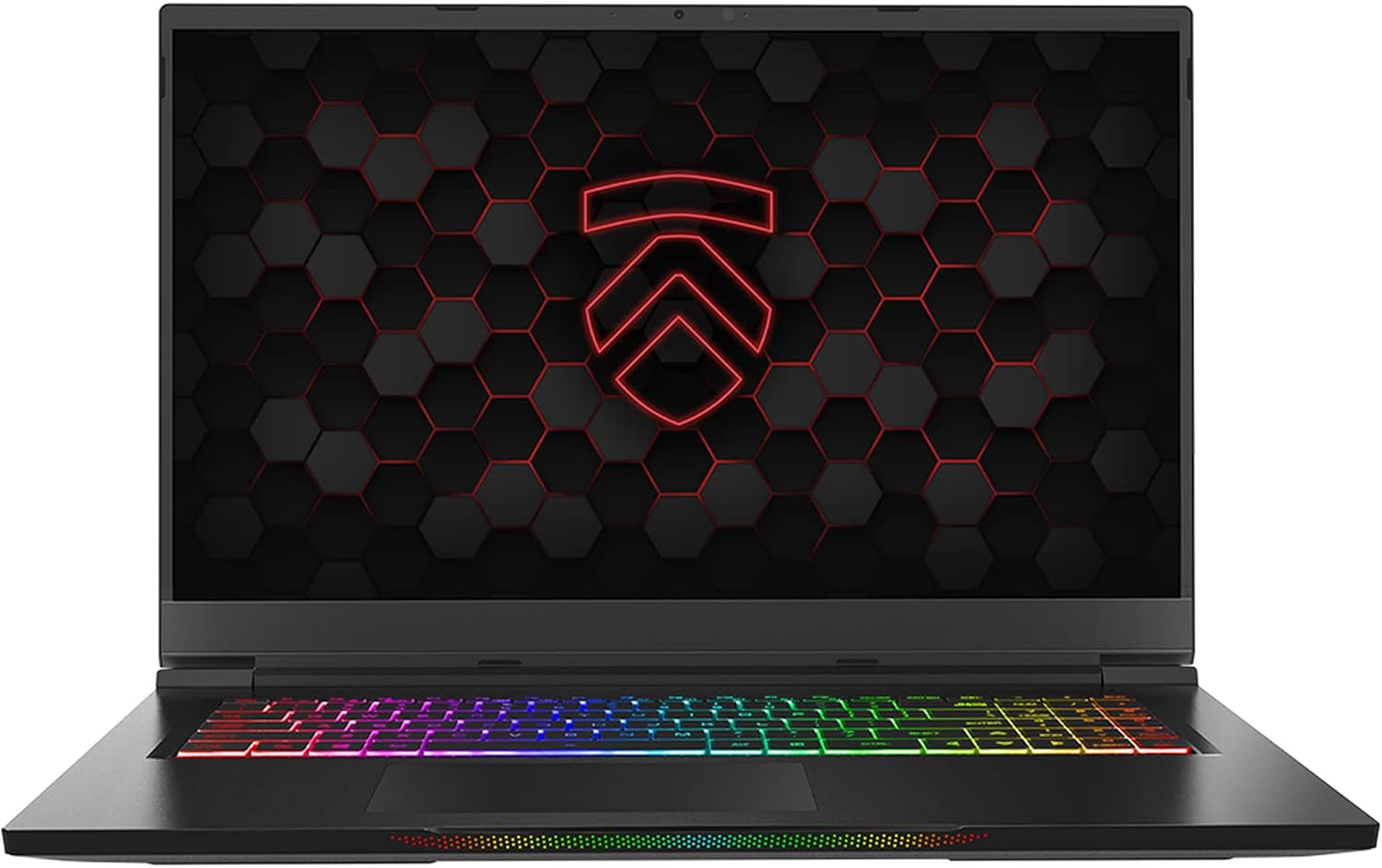
Eluktronics MECH-17 G1R Podcasting Laptop
Specifications:
- 6GB GDDR6 VRAM NVIDIA GeForce RTX 2060 graphics card
- NVIDIA GeForce RTX 2060 series graphics cards
- massive 512GB NVMe SSD storage drive
- 17.3-inch high-definition Full HD IPS monitor
- Four versatile modes of use and a new USB-C port
- Mechanical RGB Keyboard
- 6GB built-in Graphics Card
- Beautiful Full HD 144hz display
- No optical drive
Do you even need a Laptop for Podcasting?
Here’s the thing – having a laptop isn’t mandatory for hosting a podcast. You can get started with a mic, a good pair of earphones, and a mixer. However, any professional podcasting setup will require you to record and edit multiple tracks. Additionally, you may want to use a Digital Audio Workstation (DAW) or audio editing software for further post-processing.
That is why it is essential to use a computer for podcasting. It gives you the flexibility to edit audio tracks as well as add effects, music, and transitions once the recording is completed. Moreover, it lets you use Skype to host a podcast with a remotely-located guest speaker.
While a desktop works just as fine, the portability of a laptop makes it the ideal choice for podcasting. Having said that, it isn’t compulsory to buy a new laptop to start hosting your podcast series. If you’re a beginner, minor upgrades to your existing laptop can serve the purpose. However, if you want to plan a long-term podcast strategy, investing in a robust laptop is a good idea.
The only catch is that the sheer variety of laptops available in the market can be overwhelming and confusing. As a beginner, you may find it extremely difficult to identify the best laptop for podcasting. It is now time for us to take a look at the things to consider before buying a laptop for podcasting.
How to Select the Best Laptop for Podcasting?
Buying a laptop is one of the most critical decisions of your podcasting journey. As a beginner, you can’t afford to spend your hard-earned money on a fancy laptop with high-end specifications. It is, therefore, crucial to select an optimal one that meets the requirements of the DAW you will likely use. It is equally important to ensure that the laptop will be useful in the long run.
Here are a few factors you should take into account:
RAM
RAM or Random Access Memory is the amount of data that a computer can hold in its memory for processing at once. Any data that isn’t stored on RAM needs to be retrieved from the internal storage i.e. hard drive. Your computer’s processor has to wait for this data to be available before processing it. Since hard drive seeks times are often higher, it leads to unexpected delays even when you’re working with a high-speed processor.
That is why it is crucial to use a laptop with higher RAM. Higher the RAM, the better your laptop’s ability to handle multiple audio tracks, editing software, and plugins. For amateur podcasters, it is recommended that you select a laptop with at least 8GB of RAM, to begin with. If you intend to become a professional podcaster or sound designer in the future, a laptop with 16GB of RAM might be a smarter investment.
CPU
The Central Processing Unit (CPU) acts as the brain of a computer. It lets a computer process various data, carry out lengthy calculations, and perform tasks. A high-speed processor lets your computer carry out these tasks quickly. This, in turn, means it can perform more tasks within a shorter span and is capable of processing multiple audio tracks.
Apart from processing speed, you should also look into the number of cores in your CPU. A multi-core processor means you have more than one processor unit to carry out the tasks. This, in turn, enhances its computing capability and lets you use high-end plugins and DAW. This also means your computer can handle multiple audio tracks at a much faster speed.
The choice of processor largely depends on the type of DAW you want to use. For instance, Avid Pro Tools requires a quad-core processor. However, if you’re a beginner, you will find various alternative software that works on dual-core or triple-core processors. For optimal performance, it is recommended that you opt for a triple-core processor with a processing speed of at least 2.5GHz.
Latency
Latency refers to the time that lapses between the input and output of an audio signal. In other words, it is the time an audio signal takes to enter from a microphone and be heard on the monitors. It is also the delay between pressing the play button on your computer and hearing the sound on your monitors.
Needless to say, the best laptop for podcasting must have low latency. If the latency is above 20 ms, it becomes noticeable to the human ear. As long as your laptop has a high-speed processor and sufficient RAM, you need not worry about latency.
Internal Storage
Computers using hard disk drives (HDD) for internal storage often have higher seek times. This can cause a delay in processing an audio signal, thereby resulting in higher latency. An effective solution is to work on a laptop that uses a Solid State Device (SSD) for internal storage. SSDs store data digitally instead of writing it onto a disk, resulting in faster seek times.
Moreover, laptops with SSD storage cause less noise resulting in a noise-free recording environment. The only slight drawback of SSD systems is that they are expensive and have lower storage capacity. If you don’t have a high budget, look for a laptop that has an HDD with a built-in SSD. While the HDD is used for internal storage, the SSD is used to pre-load data for faster processing.
Operating System
The choice of the operating system is more personal than professional. You will find a plethora of suitable options for both Windows and Mac OS. Select the one you are more comfortable working with. You should also take your budget into account as Mac devices tend to be more expensive than their Windows contemporaries.
Another factor you should consider is your preferred audio editing software. Some software such as Logic Pro and GarageBand works only on Apple devices. However, you will find alternatives such as Audacity and Adobe Audition that work across different platforms.
DAW Requirements
DAW or Digital Audio Workstation is simply the software you use to record, process, and edit audio tracks. The choice of DAW influences the type of computer you select, including its RAM, processing speed, and OS. Pro Tools, the industry standard for audio and music production, is quite resource-intensive and needs a quad-core processor.
However, if you’re a beginner or amateur podcaster, you will likely begin with less resource-intensive software like Audacity, Adobe Audition, etc. While Adobe Audition requires a multi-core processor and at least 4GB of RAM, Audacity just needs 2GB of RAM and 1GHz processing speed. Irrespective of the DAW you use, you should take a closer look at its minimum requirements and recommended requirements.
A system that fulfills the minimum requirements will work fine for your DAW of choice. However, a computer that is closer to the recommended requirements will last you in the long run. Even though it is going to be more expensive, it will be better equipped to handle software upgrades.
Plugin Requirements
Apart from editing software, you will likely use at least a few plugins while processing your audio files. For instance, you may want to use plugins to simulate musical instruments. You could also use plugins to add sound effects and transitions.
It is crucial to remember that each of these plugins is resource-intensive and requires a robust processor. Additionally, such plugins need more RAM to work on multiple audio samples without causing significant latency. Thus, you should have a clear idea of the audio plugins you intend to use before investing in a laptop for podcasting.
Upgrade vs Replace
So, you have convinced yourself that you need a powerful laptop to kickstart your podcasting journey. However, before you hunt the market to find the best laptop for podcasting, you should give your existing laptop a try. You might be better off upgrading the RAM and replacing the HDD with an SSD.
It might be wiser than burning a hole in your pocket for an expensive laptop. You could use that extra money to invest in a better microphone or earphones. If you decide to upgrade your existing laptop, make sure you select compatible RAM and SSD. Unless you have adequate technical skills, take help from a professional to replace your installs them.
You should only consider buying a laptop for podcasting if your current laptop doesn’t have an advanced processor. Other factors such as the screen size, display quality, and GPU (Graphics Processing Unit) may also influence your decision. Moreover, the number and type of USB ports on your laptop are something you should take into account.
While it is difficult to unanimously select the best laptop for podcasting, we have compiled a list of the ones that make the cut.
I can assure you that all laptops listed below are perfectly suitable for podcasting and are based on the essential software requirements.
Conclusion
In today’s diverse market, selecting the best computer for podcasting can be painstaking. Even before you think of buying a laptop for podcast editing, you should consider upgrading your current laptop.
If you choose to buy a new one, make sure you select a podcasting laptop that is compatible with the DAW you intend to use. If your budget permits, invest in a slightly better laptop that will last you in the long run. Make sure that apart from the laptop, you have the right podcasting equipment to make your work as intriguing and aesthetic as possible.The above-mentioned list contains the best laptops for podcasting which have the most positive ratings from users. These laptop models are the most popular in the market and feature a Core I series processor.
Make sure to consider the above-listed best podcasting laptops. Compare the cost along with the specifications before the final decision. I am certain you will discover a laptop which is the very best value for one’s money. Always choose a laptop according to your needs and budget.
Frequently Asked Questions
Q: What should I look for in a laptop for podcasting?
A: When choosing a laptop for podcasting, consider factors such as processing power, storage capacity, audio quality, and portability. You may also want to look for a laptop with a high-quality microphone or the ability to connect to an external microphone
Q: What is the ideal processor for podcasting?
A: The ideal processor for podcasting is one that can handle high levels of multitasking and audio processing. Intel Core i5 or i7 processors are typically recommended for podcasting, but AMD Ryzen processors can also provide excellent performance.
Q: How much storage do I need for podcasting?
A: The amount of storage you need for podcasting depends on your recording and editing needs. As a general rule, aim for a minimum of 256 GB of storage, but consider a higher capacity if you plan to record and edit large audio files.
Q: Do I need a dedicated graphics card for podcasting?
A: A dedicated graphics card is not necessary for podcasting, as audio processing relies primarily on the CPU and RAM. However, a dedicated graphics card can be helpful if you plan to use your laptop for other tasks, such as video editing or gaming.
Best of luck with your laptop hunting.
Team – LaptopsChamp


